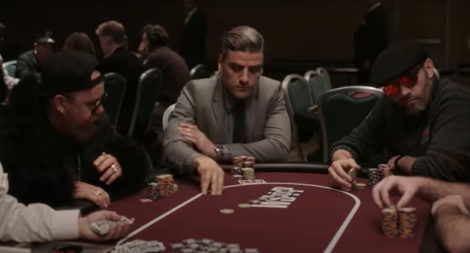The Card Counter
Front Row at the Movies by Shirrel Rhoades
[mr_rating_result]When Paul Schrader was a boy, his strict Calvinist mother stabbed his thumb with a needle to show him what Hell would feel like. It must not have hurt too bad because he grew up to be a writer and director responsible for movies with dark, hellish themes.
You may not recognize his name, but you will know his work.
Schrader wrote the screenplays for both “Taxi Driver” and “Raging Bull.” He wrote and directed “American Gigolo” and “Auto Focus” and “First Reformed.” He directed a version of “Exorcist: New Beginnings,” but it was rejected by the studio as not being marketable.
My friend Eric hung out with him on the set of “Hardcore.” He says Schrader lived up to the title. Sex, drugs, and a search for redemption.
 Paul Schrader’s films are often about characters who are “lonely, isolated, surrounded by the seedy side of sex.”
Paul Schrader’s films are often about characters who are “lonely, isolated, surrounded by the seedy side of sex.”
His latest outing is “The Card Counter,” a brooding drama about a former military interrogator turned professional gambler. The film is both dark and darkly funny, with a nagging sense of Christian morality at its core.
“The Card Counter” opens this week in select theaters.
The title figure goes by the name of William Tell. Oscar Isaac takes on the role of this card counter, giving an intense performance that is mindful of “the dangerous magnetism of Al Pacino in his early Michael Corleone days.”
Dressed in a snug leather jacket over a shirt and tie, dark hair slicked back and streaked with gray, William Tell is a man trying to project an image of control. But – you guessed it – an inner torment is gnawing away at him. He clearly exists in a limbo between sin and salvation.
You see, Tell did ten years in prison for his role in the tortures at Abu Ghraib. And he finds it difficult to live with himself.
Tell’s spartan existence is disrupted when he meets Cirk (Tye Sheridan), a college dropout who’s become fixated with taking revenge on a mutual enemy from their past (Willem Dafoe, a Schrader regular at his smarmy best). Serving in the same unit as Tell, Cirk’s father committed suicide. The boy resents that the military contractor who trained the torturers got off scot-free.
Looking for a path to redemption, Tell sets out to reform Cirk (pronounced “Kirk”). With the backing of a mysterious gambling financier known as La Linda (Tiffany Haddish), William Tell invites the boy to travel with him from casino to casino, seeking to win the World Series of poker in Las Vegas.
However, this is a movie that is about much more than poker. The odds Tell has to beat are whether he can save the boy without being dragged back into the darkness of his past.
The Christian notion of forgiveness is intrinsic to Schrader’s work, “irrespective of the extreme lengths his lost souls go to in order to earn it.”
 Schrader got a late start as a filmmaker. Being raised as a Calvinist by strict parents, he did not see a movie until he was 17 (“The Absent Minded Professor”). After studying theology at Calvin College, he talked movie critic Paulene Kael into giving him a recommendation to study film at the UCLA School of Theater, Film, and Television.
Schrader got a late start as a filmmaker. Being raised as a Calvinist by strict parents, he did not see a movie until he was 17 (“The Absent Minded Professor”). After studying theology at Calvin College, he talked movie critic Paulene Kael into giving him a recommendation to study film at the UCLA School of Theater, Film, and Television.
“Everything inside cinema rebels against spirituality,” Schrader says. “Cinema is based on action and empathy. These are not elements in the transcendental toolkit. In many ways, people who try to do spiritual or contemplative films are working against the grain of the medium itself.
Schrader seems to wrestle with his own demons. “I was raised as a Calvinist,” he sighs. “Once you get into a faith-driven belief system there’s not much you can do.”
He adds, “I wrote ‘Taxi Driver’ as personal therapy … I was in a particularly dark phase of my life and I was sort of this character – living in my car, drinking. I got a bleeding ulcer and I went to the hospital. I realized I hadn’t spoken to anyone in weeks. When I was in the hospital this metaphor occurred to me of this boy caught in this yellow metal coffin, floating through the city, trapped, surrounded by people but alone. I said: ‘I’ve got to write down this kid because I’m becoming this kid.’ ”
Paul Schrader does not seem to have expectations that “The Card Counter” will have a lasting legacy. “It doesn’t really matter what I do,” he says. “The first line of my obituary will be ‘the writer of “Taxi Driver.” ’ ”
Email Shirrel: srhoades@aol.com


Ratings & Comments
[mr_rating_form]